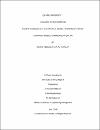User’s Technology Acceptance Model to Promote Trust Towards Mobile Commerce in Qatar
| المرشد | Choe, Pilsung |
| المؤلف | Al-Khalaf, Eiman Abdulla M A |
| تاريخ الإتاحة | 2019-02-28T09:25:05Z |
| تاريخ النشر | 2018-06 |
| الملخص | In the present fast-moving generation, the world of technology along with the support of the Internet has splendidly enhanced our daily lives. For instance, today everything is accessible on our fingertips, there is no need to even step out of our houses as our favorite products can be available in front of us and this is being possible only because of the electronic and mobile commerce technologies. The shift from in-store shopping to online shopping might have taken hundreds of years; yet, the partial conversion from web world (E-commerce), which means conducting business transactions on the Internet using computers or laptops to mobile world (M-commerce) that refers to conducting the same transactions but with the use of mobile devices has simply happened within just a decade or two (Bhragava, 2017). In Qatar, the average annual consumer expenditure is impressive. Surprisingly, only a small portion of the Qatari population has demonstrated an interest in online shopping via mobile devices due to a lack of trust. Therefore, in a multicultural nation such as Qatar, it is vital to explore the factors that can promote consumer trust in mobile commerce. The objective of this study is to present and validate a conceptual framework for trust based on the original technology acceptance model. The proposed model is classified into three logical sets: (1) motivation factors, which are comprised of three independent elements: localization, social media, and luxury brands. (2) User cognitive response that consists of three factors: perceived usability that combines both perceived ease of use and usefulness; perceived privacy; and perceived security. (3) The affective response that is mobile commerce trust the primary target of this exploratory study. An online survey was conducted amongst online users residing in Qatar to gather data and the proposed trust model was empirically validated using Structural Equation Modeling with Partial Least Squares (PLS-SEM) approach. Our findings reveal that perceived security has the strongest positive direct relationship with trust formation, followed by social media influencers, whereas localization, luxury brands, perceived usability, and privacy indirectly influence trust through perceived security. Multi-group analyses recommend that consumers identified by different nationalities, gender, and ages have slightly diverse mobile commerce trust behaviors. Finally, this research contributes towards better consumers trust on mobile commerce in Qatari community and the findings offer a number of theoretical implications for scholars as well as valuable strategies for practitioners. |
| اللغة | en |
| الموضوع | M-commerce M-Trust Localization Social media Luxury brands PLS-SEM M-commerce security M-commerce privacy Qatar Multicultural |
| النوع | Master Thesis |
| التخصص | Engineering Management |
الملفات في هذه التسجيلة
هذه التسجيلة تظهر في المجموعات التالية
-
الإدارة الهندسية [147 items ]


